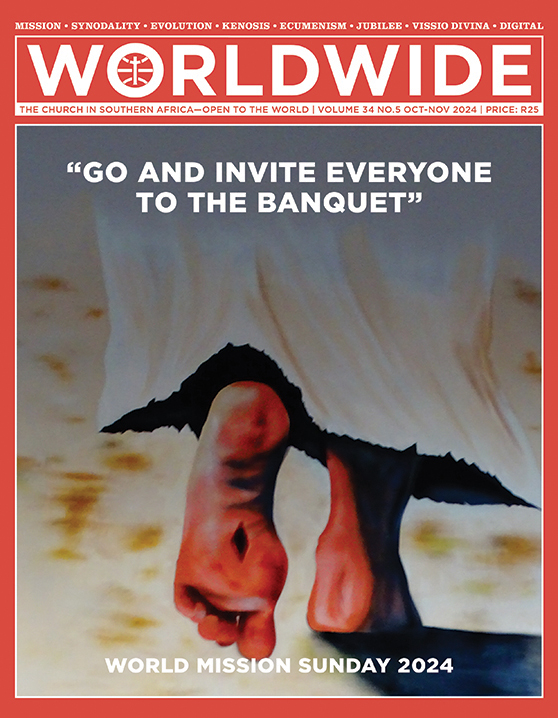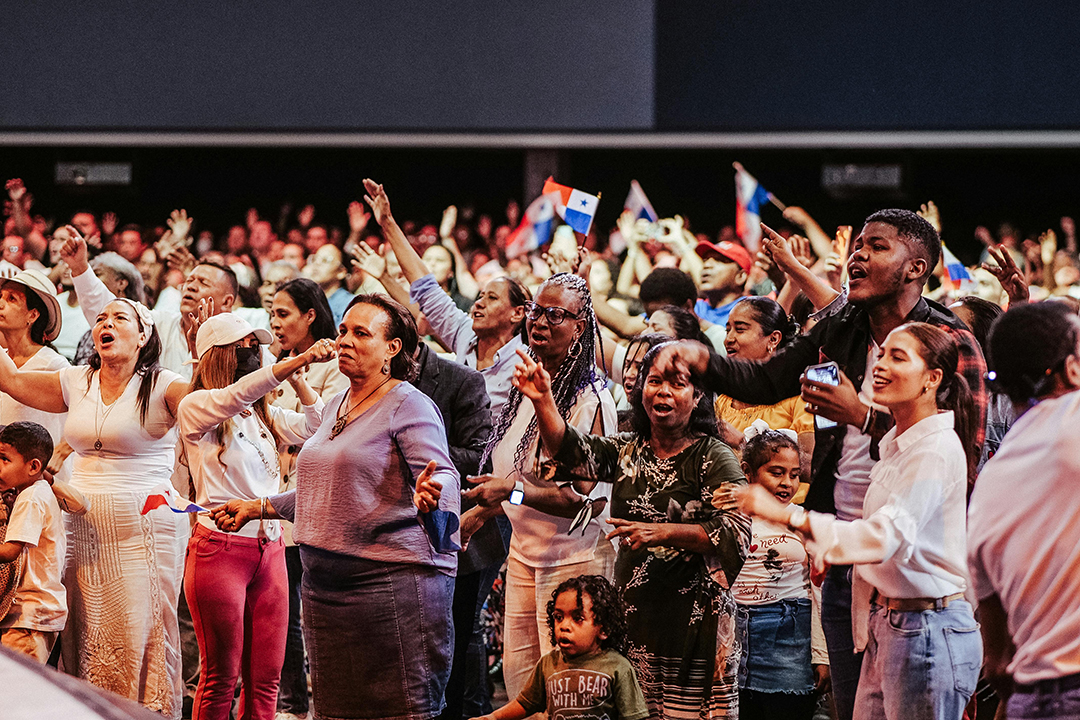
“GO AND INVITE EVERYONE TO THE BANQUET”
The image represents the feet of the Risen Jesus, in motion, showing the wounds of his Passion, yet ready to reach out and invite all to the banquet of his mercy. Likewise, Jesus invites to us to his mission in co-responsibility to bear witness to the power of his resurrection and to bring Jesus’ message of peace and fraternity to the whole world.
CHALLENGES • MISSION AS RADICAL CONTEMPLATION

(RE)EMBRACING MYSTERY
The world remains a seemingly polarized space. Some are on the left and others on the right: pro-life verses pro-choice; capitalism vs socialism and so on. According to the author, these polarities are often a result of an exclusively binary understanding of faith and of the world. Aspects of the Church’s mission need to reclaim mystery and undo a dualistic thinking by continuously adopting a radical form of contemplation.
BY FABIAN ASHWIN OLIVER | YOUTH MINISTER, JOHANNESBURG
Thinking in the Grey
A couple years ago I had an interesting debate with young people at church. What started as a conversation about Adam and Eve soon became a fierce debate about gender roles, sexuality, and the first people created by God. I recall feeling as though the debate was focused on two opposite poles; either Adam and Eve were historically the first two people created, which logically implied the subsequent gender and sexual orientation ideology, or it meant that if one negated any one of these supposed premises, one subsequently did not respect or adhere to the message of the Creation story.
In the heat of this debate, I remember causing somewhat of a stir that shocked many of the young people. I stood up and said to them, “I should tell you that there is a good consensus from biblical scholars that the story of Adam and Eve was created not as historical narration, but to reflect theologically about who we are, where we come from, and who God is. The Creation story is indeed an inspiring and powerful story.” While silence ensued, I recall seeing their seemingly confused and hurt expressions.
This moment stayed with me as a key exemplar of how the Church can become attached to absolutist dualistic ideas of God, convinced that things are either black or white. This black-or-white lens is often how we perceive the world, our bodies, and even God. Black and white literally defines symbols of good and evil or of the sinner and the righteous. This same binary underpins a false hierarchy of thinking of male as superior and female as passive inferior, and in the racial milieu of the white subject, and black object (or the other).
While this binary approach may have been helpful in the formative phase of our faith, at a certain stage of our spirituality, this way of thinking becomes blinding and an impediment not only to us, but also to the mission of the Church in the world. As Paul’s letter to the Corinthians alludes, at some point we received the things of God as infants who could only drink milk, but once we grew up, we could start eating solid food (cf. 1 Cor 3:2-4).


Fr Richard Rohr says the following about dualistic thinking: “Dualistic thinking is our way of reading reality from the position of our private and small self. ‘What’s in it for me?’ ‘How will I look if I do this?’ This is the ego’s preferred way of seeing reality. The Church has neglected its central work of teaching prayer and contemplation, allowing the language of institutional religion itself to remain dualistic and largely argumentative” (Rohr, 2017).
The dual mind has often left the Church unable to add value to current conversations without (generally speaking) strengthening the polarity of “us” versus “them.” In addition, there still seems to be some chasm between Church doctrine and current understandings of science, and even some knowledge systems including Biblical scholarship, and phenomenology (peoples’ lived experiences). Then there are the questions of social injustices and global inequality. Finally, there is a lack of embracement of questions we do not have answers for, and no space for sitting in the grey of seemingly black-or-white predicaments. Thus, I foresee a significant mission for the Church to return to (re)embracing mystery through the lens of radical contemplative spirituality.
Living with Paradox
French philosopher and Catholic theologian, Jean-Luc Marion, says that part of the power of paradoxes is that there is not much we can do with them. He states that Jesus’ use of paradox was intended to reveal in part how God’s thinking is radically different from ours. Essentially a paradox or the mysteries of faith are beyond our grasp and so we must constantly learn and unlearn.
Jesus’ use of paradox was intended to reveal in part how God’s thinking is radically different from ours.
Therefore, he maintains, “We are not yet Christian,” as we still have a long way to go in our faith pilgrimage (Woodward, 2022). We may ask what the role of mission is, when we embrace the mystery of God and work towards undoing the problematic binaries which we have entrapped ourselves in.
As a Church we should constantly think about what it means to be more inclusive. I think that part of what it means is not about including people in a way of doing things with our prejudices and biases, but about being non-exclusive in all we do. We should welcome with open arms, those different from us. We should remember that Jesus was not Christian and was in fact not there when we made our Christian doctrines which at a certain point in our history, condoned slavery, spiritualized racism, excluded women and people of different sexual orientations. Part of our mission is then to reclaim awareness that we are in the realm of God’s mystery which is revealed in our very own bodies.
The current Synod on Synodality is a consultative process of gathering information from listening sessions all over the world. If constructed properly, this listening offers a powerful window of opportunity for the Church to (re)claim and sustain the mystery of ministry for the faithful, and be attuned to God’s Spirit that is always moving us towards liberation. Hence, “Synodality is indispensable both for awakening the whole People of God to missionary zeal and for the ecumenical commitment of Christians” (Bujak, 2021:156). There are many things we do not fully understand, and therefore mystery allows us to be sensitive to the splendor of God’s calling without oppressing others.
Radical Contemplation
The word “radical” means going to the root. To align mission with radical contemplation is to suggest that mission is always grounded in the contemplation of Godself for our world. It is a way, be it through reading of sacred Scripture, meditation, or prophetic action, to be in proximity with God’s saving of the world and the invitation for us to be a part of this. Radical contemplation also means we are prepared to pursue the art of loving (God, ourselves, and neighbor/s), as opposed to first perfecting the dogma.


Through this contemplation, we can learn to live with complexity within polarities where we move from only either/or to possibilities of both/and. To phrase it differently, we can embrace a: “Duality without dualism” which affirms the fundamental connection of such concepts as being/becoming, mind/matter, and symmetry/asymmetry, but does so in a way that avoids a simplistic symmetry of the dualities (Eastman, 2004:14).
Mystery allows us to be sensitive to the splendour of God’s calling without oppressing others.
The mission of the Church is one of being prophetic and mystical for our present times. Theologian William Cavanaugh talks about a group of individuals residing on the outskirts of Manila, Philippines, who live adjacent to a garbage dump and sustain themselves by scavenging items that can be sold or consumed from what others have discarded. When the local priest celebrates mass for this community, he explains that the sign of the cross he performs over the eucharistic elements serves a dual purpose: it consecrates the elements while also swatting away flies from the chalice. This dualism reflects a connection between the sacred and the mundane; similarly, the priest perceives a strong link between the Eucharist he celebrates with this community and their political efforts aimed at enhancing their living conditions (Chemin Neuf – Net for God, 2016).
Radical contemplation as mission allows the future Church to live with “duality without dualism” and to live in the mystery of a God who is always at work. It is to be a discerning Church where everything and everyone is taken into consideration, with compassion for the complexities of life and allowing the Church itself to be transformed while remaining steadfast in the love of God. For this to happen, we need to begin by transforming ourselves.
The Clinic has a very specific mission: to be an oasis of hope.

